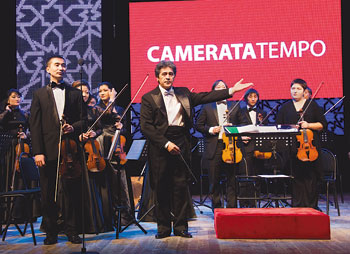ASTANA – On November 20, the Camerata Tempo First International Festival of Contemporary Composers of the Commonwealth of Independent States and Turkic countries opened here in the Kulyash Baisseitova National Theatre of Opera and Ballet.

Guests of the festival received a chance to get acquinted with the works of great musicians.
The festival was organized by the Ministry of Culture and Information and directed by Professor Gaukhar Murzabekova, national artist of the Republic of Kazakhstan who addressed the audience by video. It was dedicated to the classical music ensemble Camerata of Kazakhstan which is led by Professor Murzabekova and which celebrates its 15th anniversary this year.
The festival also celebrated the designation of Astana as the cultural capital of the CIS and the Turkic world in 2012. The main celebrations and concerts took place in Almaty on November 24, 25 and 28 at the Zhambul Kazakh State Philharmonic Hall and will end on December 8 at the Abai State Academic Theater of Opera and Ballet in Almaty.
Three of the five concerts included pieces by contemporary composers. Another presented a recital by Gia Kancheli and the gala concert will include masterpieces by Mozart, Franz Lehar, Dmitri Shostakovich, Astor Piazzolla, and Alfred Schnittke.
The festival will also present the works of Kazakhstan’s composers Balnur Kydyrbek, Vladimir Strigotsky, Artyk Toksanbayev, Tles Kazhgaliyev, Kuat Shildebayev, Adil Bestybayev and Gulzhan Uzenbaeva, as well as works by Valentin Silvestrov, Andrey Golovin from Russia, Alisher Latif Zadeh from the United States, Rashid Kalimullin from Tatarstan, Tolib Shahidi from Tajikistan, Murat Begaliev from Kyrgyzstan, Rauf Aliyev from Azerbaijan, Ulvi Cemal Erkin from Turkey, Anthony Girard from France and Anatol Vieru from Romania.
Camerata Tempo performs works by little-known composers, some of whom worked in isolation and others who died without ever having had their pieces performed in public. The festival aims to fill this gap and present the works of serious contemporary composers, especially from Kazakhstan and the other nations of Central Asia.
